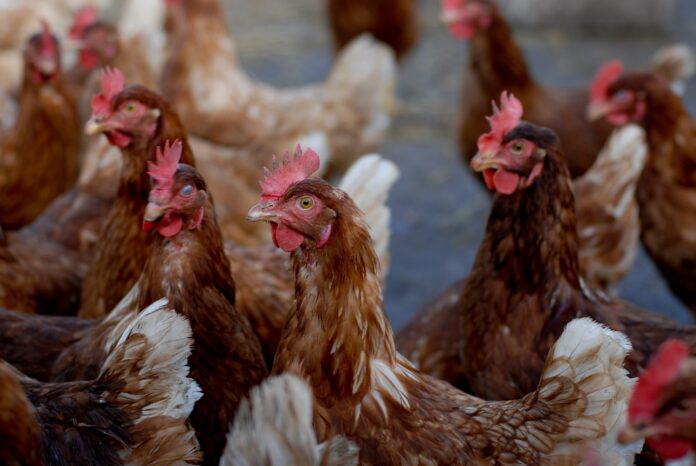In one week, Pennsylvania went from no cases of highly pathogenic avian influenza to having the second highest number of birds affected in the country.
Three more facilities in Pennsylvania were hit with bird flu. All the farms are in Lancaster County within the 10 kilometer (6.2 mile) control zone placed around the first infected farm. More than 3.5 million birds have now died or been culled to control the spread of the disease.
The first case was confirmed by the U.S. Department of Agriculture on April 16 at a facility with 1.4 million commercial layer chickens. It’s believed the case came from a wild bird, said Pennsylvania Agriculture Secretary Russell Redding, during an April 22 media call.
The state department of agriculture put a 10 kilometer control zone around the infected farm, which requires facilities have an approved biosecurity plan and increased testing for bird flu before any poultry or poultry products can be moved out of the area.
Two more cases were reported April 20 within that control zone, at farms with 1.1 million and 879,400 commercial layers. A fourth case was confirmed April 22 in a commercial broiler flock of 50,300. It’s not known how these cases were spread.
“We’re encouraged in the first week,” Redding said. “The control zone was critical.”
HPAI has been detected in 235 commercial and backyard poultry flocks in 29 states since the first case was confirmed in February. More than 31 million birds have died or been culled nationwide.
Response
There are 103 commercial poultry farms within the quarantine zone. Lancaster County is home to 16% of the poultry operations in Pennsylvania, with 1,677 farms.
Lancaster County was also ground zero for the 1983-84 bird flu outbreak in Pennsylvania, which spread throughout the south central part of the state. More than 17 million birds were lost as a result of that outbreak, from flu fatalities and preventative culling.
That outbreak shaped the way Pennsylvania prepares for and responds to animal disease outbreaks, Redding said.
“The changes over the last 38 years have all been playing out here in different ways,” Redding said.
There’s now an interagency HPAI task force, increased testing capabilities and biosecurity programs for farms. Last year, Pennsylvania’s three animal health laboratories analyzed nearly 200,000 samples for bird flu.
The department of agriculture put a temporary ban on the exhibition of poultry and eggs and county and local fairs in Pennsylvania for 60 until June 15, although Redding said they’ll be reviewing that decision, possibly to extend the ban through the entire fair season.
Pennsylvania avoided any positive cases during the 2015 bird flu outbreak that affected 50 million birds in 15 states.
No public health concerns
Avian influenza viruses occur naturally and are ever-present in wild birds that spread the virus in their droppings and wherever they land. These bird flus are highly contagious and often fatal to domestic birds.
The U.S. Centers for Disease Control and Prevention said bird flu outbreaks do not present an immediate public health concern. No human cases of bird flu have been detected in the U.S.
The Pennsylvania Department of Agriculture said in a press release that the chances of infected poultry entering the food chain are extremely low “due to the high frequency of testing facilities.” Additionally, poultry products for public consumption are inspected for signs of disease at multiple points from farm to store. Poultry and eggs that are stored and cooked at proper temperatures are safe to eat.
Commercial poultry farms and people with backyard chickens should be on high alert and take steps to protect their poultry, the department said. Don’t visit poultry barns unless absolutely necessary; thoroughly clean vehicles and shoes after visiting poultry barns; and keep birds indoors to protect them from contamination by wild birds.
Biosecurity plan templates for backyard flocks can be found online at www.agriculture.pa.gov.
How to report concerns
If you suspect your poultry is infected with avian influenza, report your concerns to the Pennsylvania Bureau of Animal Health and Diagnostic Services at 717-772-2852, option 1.
Sick or dead wild birds should be reported to the Pennsylvania Game Commission at 610-926- 3136 or pgc-wildlifehealth@pa.gov.
(Reporter Rachel Wagoner can be contacted at 800-837-3419 or rachel@farmanddairy.com.)










